- Home
- Peter Carey
A Long Way From Home Page 14
A Long Way From Home Read online
Page 14
Then came a mighty percussion and I recognised the brutal slap of gelignite. My innards came into my mouth and the whole rear end was smacked sideways across the road.
‘Controlled explosion,’ Titch said. ‘Take a joke.’
‘GRID in two clicks.’
Now a corrugated road, in the Plymouth’s dust. I waited for the second explosion as we shook and rattled at sixty miles an hour while Mrs Bobbsey shouted F and C and B and S like a woman giving birth.
My Lord, she stirred me up. I would not have missed it for the world.
5
By now, I thought, my reported comments to the Sydney journalists must be wrapped around fish and chips. If so, that was not enough to save me from my punishment. My husband had read the Sydney press in Brisbane. He had not said a word. He had stewed in private for four hundred miles. Not until we were dealing with overheated tyres did he judge it time to speak.
He was disappointed, he said.
It was not so much what I had said about his father. It was the damage I had done to the value of our name. This was why we were in the Redex, apparently. I had thought it was so he would have something to look forward to, but I must have been wrong. We were in the Redex to ‘merchandise’ our famous brand.
He stank of Dunstan.
He said there was a knack in talking to reporters. It was one thing to criticise his father but perhaps I could learn from Dan and how he used the newspapers. There was a definite art to it.
Art. Fart. He pulled the rug from under me and never knew what he had done.
We stopped at Toolooa, some place spelled like that approximately, just a few miles inland from a lovely beach I never saw. There was an abandoned petrol station and a working telephone box. It was in this place I discovered Ronnie had the measles. Beverly was waiting for the doctor’s call so please get off the phone.
I asked my husband what we should do now. He said we had to make up time.
They reckon Gladstone is the gateway to the wonders of the Great Barrier Reef. I remember the smokestacks, and my despair on learning that the doctor had still not arrived in Bacchus Marsh. We were now twelve hundred miles away from Ronnie. It was the day I drove the so-called ‘Horror Stretch’, well named for every minute of what lay ahead. The unexpected comfort came from Bachhuber. I was so grateful for his reassuring hand as we dropped down into a creek and slammed the armour-plated diff against the rocks.
‘Nicely played,’ he said.
Then Titch was driving, pushing the speed, but he drifted wide around a bend and nearly hit Dan’s Plymouth: on its roof in the middle of the sugar cane. Don’t stop, I thought. We don’t have that luxury. How bloody sad to feel him brake. He was still his father’s dog.
6
The first Aboriginals I ever saw were rocking Dan’s Plymouth back and forth. As I crossed the road the car rolled upright and stood on its wheels again, swaying, steaming, in a nest of sugar cane. The red-headed co-driver was already back behind the wheel.
While Dan checked all the vehicle’s windows, his new friends pressed around him eagerly.
What conversation took place between them was difficult to know although the voices of the rescuers became progressively higher in their pitch.
There was also a quieter fellow, perhaps sixty, not tall like his boyish comrades, but broad shouldered and barrel chested, with a deep furrowed brow, hooded bloodshot eyes, grey stubble and a mischievous disposition. The younger men were a flock, in persistent negotiation with a moving but resistant centre. This was Dan who had, he said, no baksheesh.
The older man showed no interest in this altercation. All his attention was on me.
I held out my hand. He took it.
‘Where you bin grow up?’
‘Near Melbourne. Far away.’
‘Bloody Yarra River,’ he said, not inclined to release his hold. Then, suddenly, he tugged my fair hair. At the time I thought this strange. I think it even stranger now.
‘Proper whitefellah,’ he said.
‘I’m Willie. Willie Bachhuber.’
‘Bachhuber no way,’ he said.
My scalp was stinging, but he was smiling. I had my driver’s licence and I showed him.
‘Proper whitefellah,’ he smiled. It would be days before I realised he knew more than I did. In any case, I would never have allowed the possibility that he was being sarcastic.
I thought, dear God. Perhaps his grandparents had been killed by white men. ‘Goulbolba?’ I asked, because this was Goulbolba country on my mental map.
‘Bachhuber,’ the man said.
Perhaps I mispronounced Goulbolba. ‘Goodbye,’ I said. The Plymouth’s engine roared. The air was full of violent dust. My shins were stung by a shower of gravel. The young men threw a stone or two at the fleeing Plymouth and then turned on Titch whose hand was already in his pocket.
The old man had another go at my hair, but I was ready for him, and he laughed when I clamped his wrist.
Back in the car I arranged my clipboard and my map. I said nothing about the tragic history of these men Titch was calling ‘boongs’.
10.2 MILES. LEF T RIGHT BEND ON CREEK.
It was hard going. It took all of eighteen minutes before we reached the place where I glanced upstream and saw, to the west, amongst the tangled flood-washed tree trunks, another Redex car, a Holden, decked out in violent racing livery with decals and a number it is wisest I not mention. The car was pitched nose-down, almost vertical, pointing into the dribbling creek. Rolled vehicles would soon be a common sight but this second one seemed impossible. Its back wheels were in the air, leaving its springs as naked as a corpse’s private parts. Titch quietly braked and killed the engine. He indicated we were to leave both the car and Mrs Bobbsey.
We called ‘coo-ee’. Otherwise the creek was quiet with no birdcall except a mournful currawong crying, as usual, like a lost child. We clambered over the snaggy tree trunk flotsam and saw, through the open driver’s window, strip maps scattered front and rear, and the key in the ignition. There was a strong smell of mashed bananas.
The crashed vehicle seemed so perilously arranged I would not have gone anywhere near the radiator, but Titch, having placed himself in a position where he might have been crushed to death, announced the radiator was almost cool.
There was something oddly furtive about him now, and he climbed up a mouldy tree trunk to the floodtime bank and stood, like a yellow-gloved wood spirit, with his left hand supporting his right elbow, and his right hand across his bright red mouth.
‘Tell her to bring the car down here,’ he said at last.
‘How?’
‘Along the track we walked on.’
‘She can’t drive there.’
‘Just tell her, Willie.’
It was the first time he called me by my Christian name.
7
The car was stopped, my husband vanished. Bachhuber was at my open door apologising for waking me: there had been an accident. Would I kindly drive our vehicle along the track beside the creek. I did so, imagining we were on a mission of mercy.
But then Titch announced we were to remove a set of rear leaf springs. I asked would he make his wife a graverobber. He winked, and I saw he planned to somehow cheat.
Bachhuber and I worked on the teetering carcass exactly as we had done the drill in Bacchus Marsh. There was a bad smell of rotting leaves around the scene, and it was still clinging to our clothes later as we hid the looted springs and clips beneath our own rear seat.
No-one told me that we would be able to re-use these springs without penalty. My husband kept that secret from me. The Redex scrutineers had used radioactive paint on the original components. So if we used these stolen springs the Geiger counters would not know. Witnessing this deceit I thought of Mrs Markus.
We still had six hours’ drive to Townsville, and when we had stowed the springs it was come on, hurry, come on, pedal to the metal. I said I must attend to a call of nature. He told me to be real. I tho
ught, he has wasted time to help his father, now he can waste some time on me. I deliberately took along my front page interview to wipe my bottom. If he noticed he did not comment.
Being a man the navigator was surely thinking like they do, that I must remove my overalls and be nude as Eve just up the track. So I went a long way up the creek, amongst a nest of broken sticks and leaves and timber smashed up by the floods. I carried our little garden trowel, until I came upon a huge tree ripped out by its roots so it left a crater six feet deep. That saved a lot of digging. I teetered over the crater, naked as the day, clinging to a mud-crusted tree root.
My call of nature was just a whisper. On the crater walls, only a foot from the surface, I saw the roots had grown around dead bones. The first crumbled in my hands and I saw there were so many others, a graveyard, sickening. That is, these were not animals. There were so many, they must be blacks.
I extracted a human jawbone. I retreated. I rushed back into my overalls. I was an interfering woman. I climbed down into the excavation where I was able to lift a human skull from the broken soil.
It was just a tiny thing, as fragile and powdery as an emu egg.
I was a mother. I knew what it was to hold a tender child and I knew this must be a little boy, and all these bones around him must be his family. He was quite clean, and very light, and it seemed he might turn to dust if I was clumsy. So I tucked the digging tool in my back pocket and held him in both hands, then carried him, as carefully as if he were a bowl of water, back through the dull shrubs and grasses.
When I arrived at our car I showed them what I had.
‘It’s OK,’ Titch said, ‘I’ll drive.’
He had nothing more to add.
The navigator opened the back door for me but then he stood in front of me, peering down at my little fellow, so long dead. Bachhuber had a pencil stuck behind his ear, as always, and now he removed it and I moved the little head away from him. But no, he said, he wished only to point out the round hole, right where the little ear had once listened to the water of the creek.
God knows why I cried about something so long ago. My husband did his best to understand but this was not our fault. We never knew this piccaninny.
I didn’t drive for the next six hours but I felt the angry corrugations on the road as big as railway sleepers. I smelt the leaves from the riverbank like the abattoirs and tanneries from my childhood. Poor little boy, I held him like a mother does, with my palm around the back of his head. Then the road was deep between the shivering sugar cane, twelve feet tall it seemed. We were insects speeding through the secret grass. Sometimes we had horizon, sometimes not. Then we idled in the morning dark as farmers set the cane on fire. Ash blew through our open windows.
‘Burdekin snow’ they called the cinders. I held his little smudgy head and listened to the cane fire in full roar.
I nursed him as we passed through endless cane fields. The tropical towns had smokestacks and lumpy mills and grey wornout houses built on poles. There was rambling bougainvillea so big and old it was pulling down its trellises.
Finally, at dusk, we checked into the Townsville showgrounds. In the giant fig trees above our heads, hoards of lorikeets squabbled over who would sleep with whom and where. It was a foreign land to me.
When my husband was informed I intended to take the skull to the police station he ordered Bachhuber to accompany me.
I would have appreciated it if he could come along himself. No, he had to see a man about a dog.
Careful he doesn’t bite your bum, I did not say.
The showgrounds were in Townsville’s West End and the police were at least two miles away. So the locals had plenty of time to gawp at me. There was a woman wearing overalls. Well, blow me down. The police station was as big as a factory and here we found a sergeant grappling with a black man the worse for wear and we had to wait until he had been escorted to his ‘sleeping quarters’ before we could state our business.
I will not say the sergeant laughed or smirked but he was certainly discomforted and had great difficulty in knowing how he could assist the Redex crew.
So what was I meant to tell him? Was it really such a puzzle? A crime had been done by someone.
Bachhuber pointed out the bullet hole.
‘Your boyfriend has forensic knowledge?’ the policeman asked me. Then, to Bachhuber: ‘It looks like you might have a personal interest in the dusky races, mate.’
‘Oh really?’
‘Just looking at you, mate. It’s obvious.’
‘What do you see?’
‘It might not be obvious where you come from, mate. Up here we have what you might call an educated eye.’
I asked him what this had to do with dusky races.
‘You’re from the south, Missus? Your boyfriend is a white man
in the south?’
I thought, we’ll have a good laugh about this tonight.
‘Then good on you. Good luck to you both. As for this matter.’
He pushed the little head towards me. ‘You should consider it a souvenir. It may even be worth a bob or two down there. What’s so funny, Jimmy?’ And he stared at Bachhuber until he looked away.
‘Now,’ he turned to me, ‘here’s what we’ll do about your lost and found.’
From deep in a drawer he produced a large receipt book with many sheets of carbon paper. He fetched a steel nibbed pen of the type you see in post offices and on the form he wrote: Abo infant skull found near Funnel Creek/Finch Hatton.
I did not question how he knew the child had been Aboriginal or how he guessed the placenames and I had no choice but to accept the piece of paper together with the skull. He had no room to store it, so he claimed.
I carried the small cardboard box into the tropical night and I suppose we were both thinking the cop must be troppo. I was embarrassed, so I held my tongue. The air was rank with flying foxes and I saw them blanket the sky above the showgrounds like bombers on a raid.
The Redex crews had gathered at the West End Hotel where small bats were feasting on the insects around the lights. The pub was like a glowing wedding cake, built in the ornate style of years gone by. The public bar was on the ground floor but the crews were all upstairs, crowded on the wide verandah, leaning over the floral cast-iron balustrades. My husband was in a jolly mood, calling down to us to join him.
I felt foolish with my cardboard box and hid it beneath the stairs. Then the only obstacle was a green frog, as big as a dinner plate, sitting bug eyed on the landing. I politely stepped around him. Upstairs I found a barmaid who demanded I name my poison and I said I’d have a beer and asked Bachhuber what he’d have.
‘You got your certificate?’ she asked him.
‘We’re not from here,’ he said.
I said I had no certificate either.
‘You don’t need one, love, but he knows what I mean.’
Of course I ignored her nonsense. I ordered a beer for me and a lemonade for my navigator.
‘Well he can certainly have that,’ she said, and whatever tickets she had previously required, she did not want them now. She must have seen how warmly we were accepted by the crème de la crème, famous drivers with their war stories e.g. a Hillman somersaulting three times before sliding to a halt on loose gravel, a Vanguard flying from a jump-up and landing with such a thump its rear window fell out. We were an elite crew who had not lost a single point. In less than a minute, I would be inches from Lex Davison and Jack Brabham who would soon become our mates.
And there he was, in the midst of all his towering heroes, the very complicated bloke I married. Handsome Titch Bobs was once again illuminated by inner light, a leader in the 1954 Redex Trial, pushing his finger into Jack Davey’s chest.
He got the usual laugh for being a ‘business maggot ’ from Bacchus Marsh. He was understood, celebrated, high above the Townsville showgrounds, and I saw no reason to dwell on his deceit in the matter of the looted springs.
Across the Top End,
1600 MILES
1
The Bobbseys had pre-booked a room for themselves in the hotel. I was allocated a cot in an abandoned wartime barracks where I cleaned the frog droppings from the floor, squeezed lemon juice on ears and toes, pulled the sheet over my head and stretched my legs out straight at last. By the time the drunken crews returned, my brain was far away, filled with endless looping roads.
My ears were itching from mosquito bites. In my dream I had become a black man in a court. I suppose this was set off by the idiot in the police station, driven hysterical by his own white purity. In my dream I was accused of being a spy. I was brought before a judge who was a ‘connoisseur of race’, the ugly term stays with me. He thought I possessed knowledge of all routes, paths, roads, ancient and modern tracks like veins and arteries and the viscera of prawns. The Curta fell apart. I scrambled on the courthouse floor searching for the screws, impossible, too small to hold.
There was a farting competition in the barracks.
Meanwhile, in my dreams, I had hundreds of maps but I was no longer sure which was the official route. Beverly was somehow
there. She made a dirty joke about ‘route’ and ‘root’ and ‘rubber’. She gave me an eraser and I must rub out all these Vacuum Oil and Shell and Esso routes or I would be disgraced. Mrs Bobbsey was present, whispering that she would kill to win. She showed me a peculiar screwdriver, in confidence. The crumbling eraser destroyed fierce lines of bluish black crushed ants. I called the turns in a foreign language – ahe phlupwa. I thought, I must remember this.
My face in the shaving mirror, white as it ever was.
It was the men’s opinion, at the self-serve breakfast in the barracks, that Mrs Bobbsey was up herself. She had drunk too much. She had boasted she was going to win. I fled the barracks for our car where I napped amongst the backseat jumble until Titch arrived with bloodshot eyes and Alka-Seltzer. I accompanied Mrs Bobbsey to the newsagent where we found ourselves amongst the favourites. There was a telegram for Mrs Bobbsey and one for me.

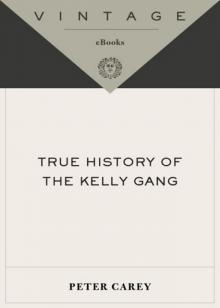 True History of the Kelly Gang
True History of the Kelly Gang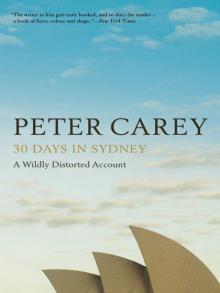 30 Days in Sydney: A Wildly Distorted Account
30 Days in Sydney: A Wildly Distorted Account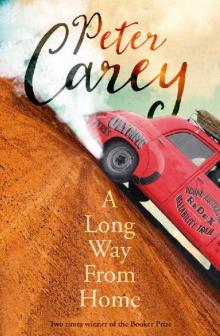 A Long Way From Home
A Long Way From Home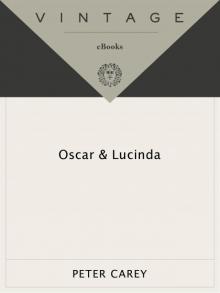 Oscar and Lucinda
Oscar and Lucinda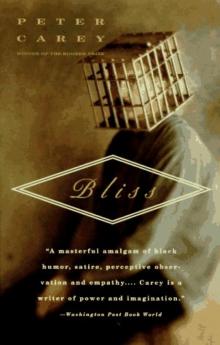 Bliss
Bliss Wrong About Japan
Wrong About Japan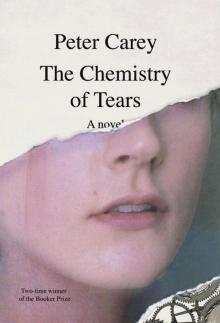 The Chemistry of Tears
The Chemistry of Tears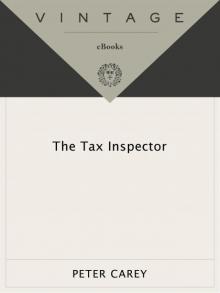 The Tax Inspector
The Tax Inspector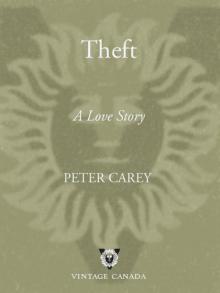 Theft: A Love Story
Theft: A Love Story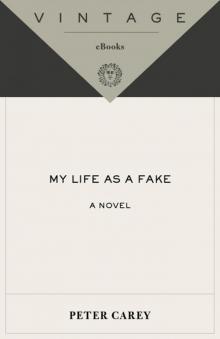 My Life as a Fake
My Life as a Fake Collected Stories
Collected Stories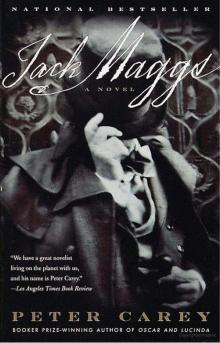 Jack Maggs
Jack Maggs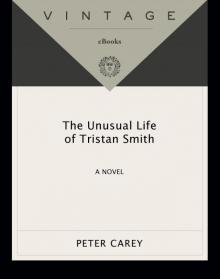 The Unusual Life of Tristan Smith
The Unusual Life of Tristan Smith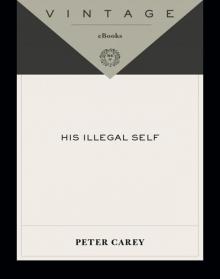 His Illegal Self His Illegal Self His Illegal Self
His Illegal Self His Illegal Self His Illegal Self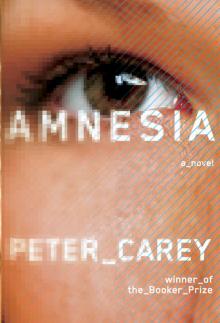 Amnesia: A Novel
Amnesia: A Novel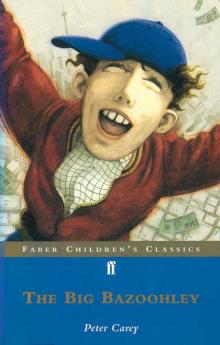 The Big Bazoohley
The Big Bazoohley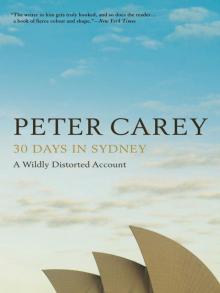 30 Days in Sydney
30 Days in Sydney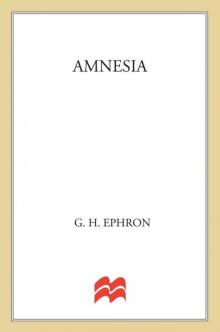 Amnesia
Amnesia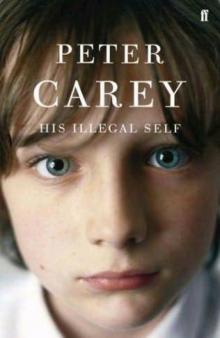 His Illegal Self
His Illegal Self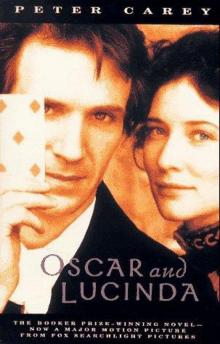 Oscar and Lucinda bw-1988
Oscar and Lucinda bw-1988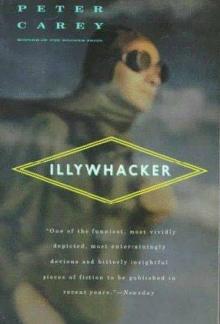 Illywhacker
Illywhacker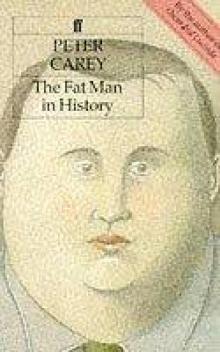 The Fat Man in History aka Exotic Pleasures
The Fat Man in History aka Exotic Pleasures